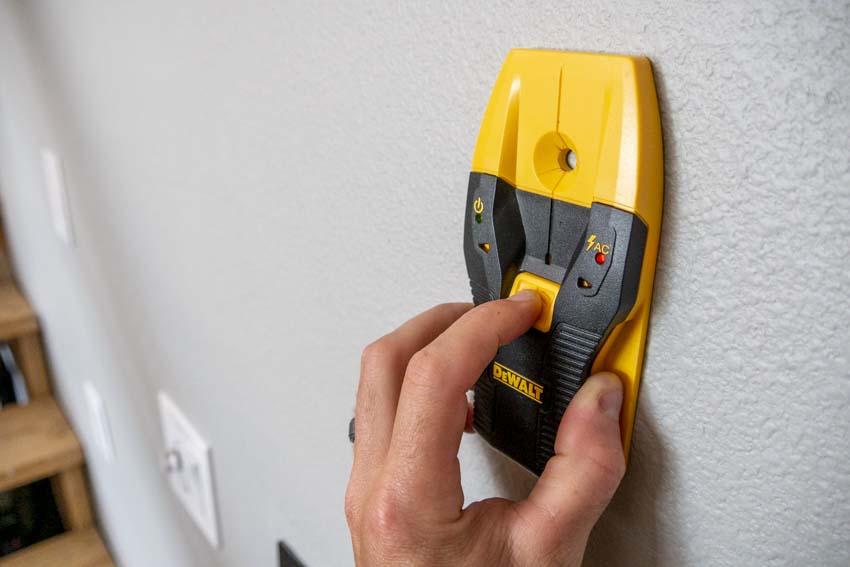Stud finders are great for locating the studs behind your walls. The tried-and-true “tap and guess” method might work in a pinch, but how many holes do you really want in your wall? Grabbing the best stud finder can help eliminate some of the frustration and repainting that comes from less modern methods.
With a focus on residential and light commercial construction, our team uses stud finders all the time once the drywall is up. Even when we’re not using them professionally, there are always pictures and mirrors to hang, shelves to mount, and any number of projects going on around our homes.
There are a lot of “best” stud finder options out there. But let’s face it, there’s no single model that’s exactly what everyone needs. To help you out, our team has broken out a list of our favorite stud finders in a variety of situations along with what we like and don’t like about each.
Best Stud Finder – Our Top Picks
- Best for Professionals: Franklin ProSensor M210 – Buy from Amazon
Jump to this Stud Finder ↓ - Best Electronic Stud Finder: Franklin ProSensor T6 – Buy from Acme Tools
Jump to this Stud Finder ↓ - Best Magnetic Stud Finder: CH Hanson Magnetic Stud Finder – Buy from Acme Tools
Jump to this Stud Finder ↓ - Best Stud Finder with a Laser Lever: Craftsman 2-in-1 Stud Finder – Buy from Amazon
Jump to this Stud Finder ↓ - Best Stud Finder for Plaster Walls: Zircon MetalliScanner m40 – Buy from Amazon
Jump to this Stud Finder ↓ - Best Stud Finder for Home Use: Ryobi Whole Stud Finder – Buy from Home Depot
Jump to this Stud Finder ↓ - Best Stud Finder for the Money: HART Professional Stud Finder – Buy from Walmart
Jump to this Stud Finder ↓ - Best Stud Finder App: Stud Finder by Tue Nguyen Minh – Download for iPhone
Jump to this Stud Finder ↓
Also In This Article
- Best-Selling Stud Finders
- More Recommendations from Brands We Trust
- What is a Stud Finder
- Tips for Using a Stud Finder
- Why You Can Trust Pro Tool Reviews
Related Content
Best Professional Stud Finder
Franklin ProSensor M210
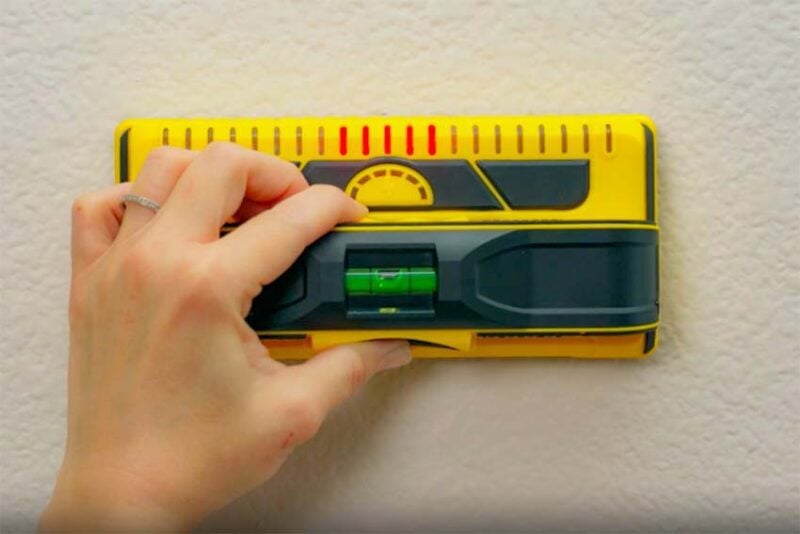
Franklin Sensors makes some of the best stud finders in the game and covers a wide range of styles with a close eye on professionals. The best of the best is the ProSensor M210. Featuring 13 sensors with 21 LEDs over a 7-inch width, this model is more precise in both the sensor and the display than other options.
Using AA batteries for power, it’s capable of detecting the full width of wood or metal studs up to 1.7 inches deep, which is handy if you’re working on walls with more than the standard single sheet of drywall covering it. There’s an AC detector to let you know if there are live wires nearby and a built-in level to help you lay your markings straight. There’s even a pencil caddy to keep a pencil on board so you have one when you need it.
Pros
- Whole stud detection
- Deep sensing
- 13 sensors with a precision display
- One-hand operation
- No calibration required
- AC detection
- Built-in bubble level
- Made in the USA with global materials
Cons
- Bigger than many units
- More expensive than basic stud finders
Price: $62.99
Best Electronic Wall Stud Finder
Franklin ProSensor T6
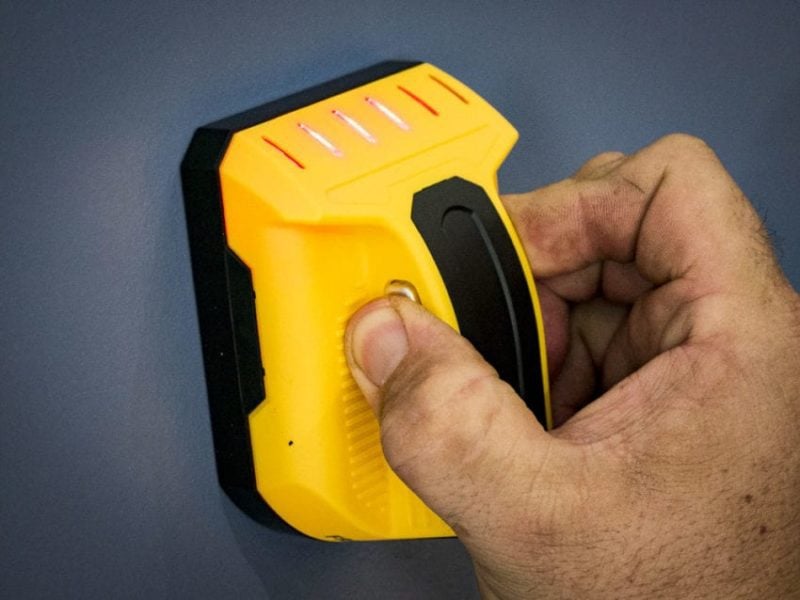
If you’re the type of person who’s willing to spend a little more to save time and get better results, the Franklin ProSensor T6 is the best compact stud finder. Its small profile is easy enough to store in a drawer or toolbox until you need it, and its whole-stud detection meets the needs of full-time Pros.
Operation is simple and one-handed. The $25 price tag is higher than an inexpensive magnetic model, but it will make your projects go so much more smoothly. It’s seriously worth stepping up.
Pros
- Whole stud detection
- Easy operation
- Pro-level accuracy
- No calibration needed
- Small profile stores easily
- Made in the USA with global materials
Cons
- More expensive than basic stud finders
Price: $24.99
Best Magnetic Stud Finder
CH Hanson Magnetic Stud Finder 03040
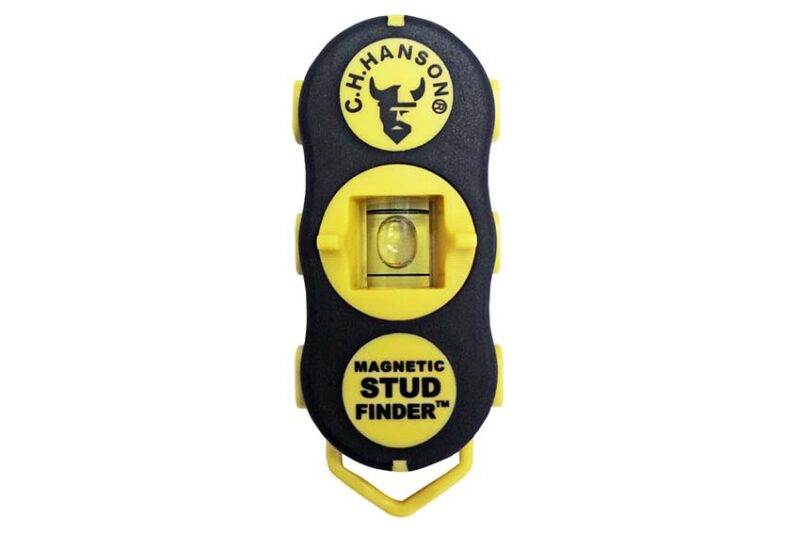
Magnetic stud finders get us back to where it all began—using a magnet to feel where nails or screws are in the stud. Simple options like StudPop work well, but the CH Hanson Magnetic Stud Finder had the most appeal to our team.
It has stronger magnets than many competitors, guiding you to the fasteners easily. It also has a rotating bubble level.
Without the ability to electronically sense the sides and center, it’s important to get the stud finder level so you can more easily follow the stud. Of course, that assumes the stud itself is straight. We’ve seen some that are questionable in that department.
We’re not alone in thinking CH Hanson makes the best magnetic stud finder. Customers consistently rate it very highly at every retailer that sells it.
Pros
- Tried-and-true simple operation
- Strong magnets
- Detects ferrous metal studs and wood stud fasteners
- Integrated rotating bubble level
- Inexpensive
Cons
- Unable to detect wood stud sides and center
Price: $11.99
Best Stud Finder With Laser Level
Craftsman 20-ft Self-Leveling Line Generator Line Laser Level CMHT77636
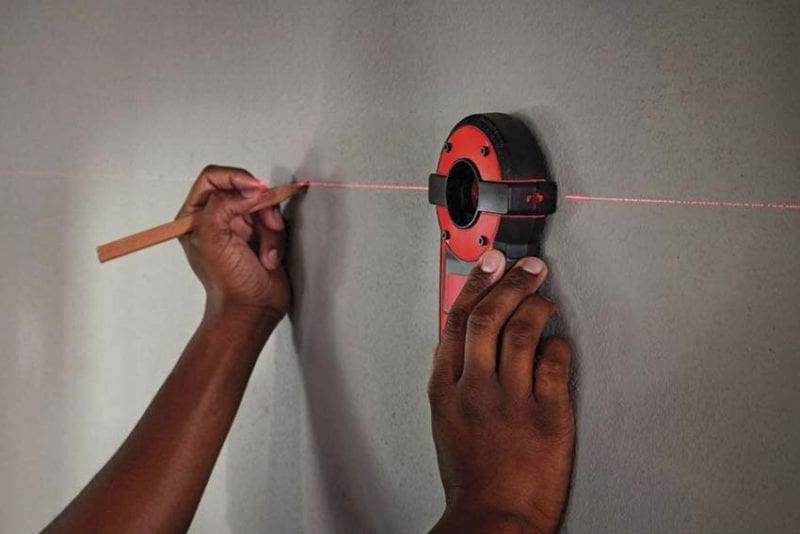
The best model with laser level goes to the Craftsman 20-ft Self-Leveling Line Generator Line Laser Level. By combining a horizontal auto-leveling laser level with a stud finder, you can take care of hanging multiple pictures or longer items with more confidence.
On the stud sensing side, it detects both wood and metal studs by identifying the edges. The red laser is visible up to 20 feet and has 1/8-inch accuracy.
As a 2-in-1 option goes it works. There are some limitations, though. Unlike most dedicated cross-line lasers, there’s no vertical line or ability to lock in an angle for creative installations. It’s also possible to break off the hanging pin if you try to force it in at an angle. If those are functions you need, consider going with a dedicated stud finder and cross-line laser as separate models. Several brands have combo bundles available.
Pros
- Stud find and laser level in one
- Auto-leveling up to 4.5º
- Detects wood and metal studs
- Detects live AC
Cons
- No vertical laser
- No angle lock for the laser
- The hanging pin can break off
- More expensive than other homeowner-focused stud finders
Price: $55
Best Stud Finder for Plaster Walls
Zircon MetalliScanner m40
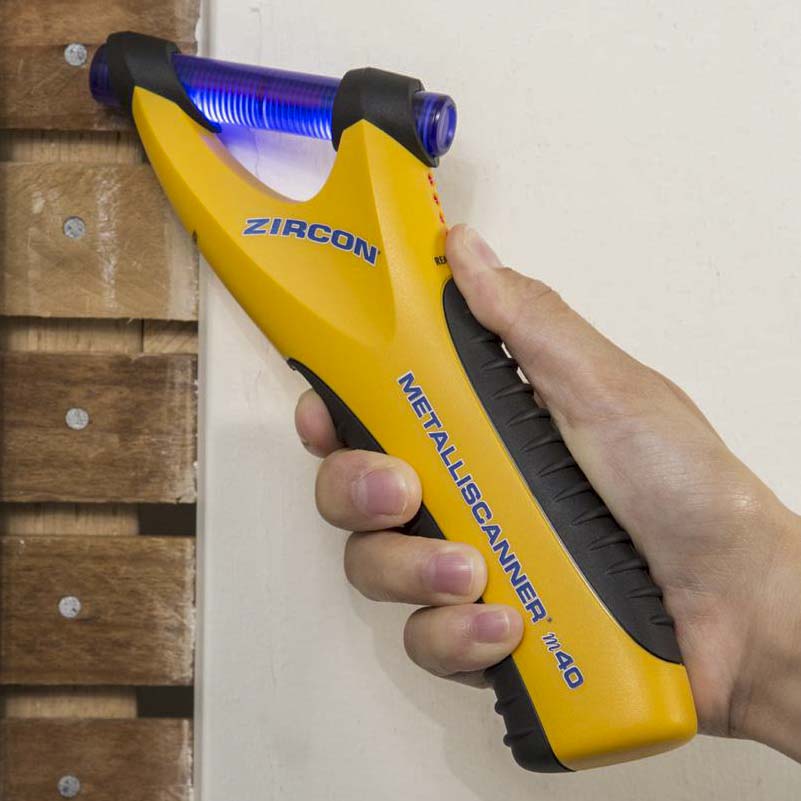
Trying to accurately find studs inside a plaster wall is hard. Magnetic stud finders often won’t penetrate far enough and electronic models are iffy at best. Our selection as the best stud finder for plaster walls isn’t technically a stud finder—it’s a metal detector. In our experience, metal detecting gives us the best results.
The Zircon MetalliScanner m40 can detect metal in a variety of materials, including plaster. Like a magnetic finder, you’re searching for nails or screws. Lathe can have more nails than the ones just on the stud, so once you find a good stud, measure out from there.
Pros
- Senses metal deeper than magnetic models can attract
- More accurate in plaster than standard stud finders
- Pinpoint scan (turning the scanner sideways) helps identify nails and screws more easily
Cons
- Not a good option if you have wire mesh in your plaster walls
- Metal pipes and other metal objects may throw off your search for studs
- You need to run it multiple times horizontally and vertically to ensure the most accurate results
Price: $46.97
Best Stud Finder for Home Use
Ryobi Whole Stud Detector ESF5002
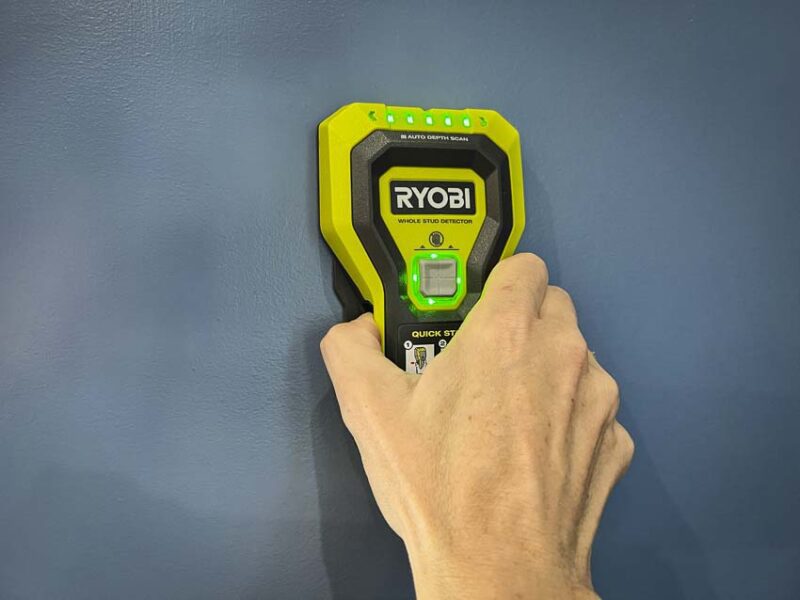
Earning our pick as the best model for home use, Ryobi strays from traditional designs and made a solid one-hand model. The ESF5002’s elongated physical form gets your hand out of the way so it’s easy to see the LEDs even when you’re reaching up and keeps all of the controls and stud marker at your fingertips.
This model uses AAA batteries, so there’s a good chance you already have some on hand when it’s time to replace them.
Pros
- Whole stud detection
- Finds metal or wood studs
- Simple one-button operation
- No calibration required
- Built-in marker
Cons
- The ergonomics aren’t for everyone
- No AC detection
Price: $31.97
Best Value Stud Finder for the Money
HART Professional 9-LED Stud Finder HART9PRO2
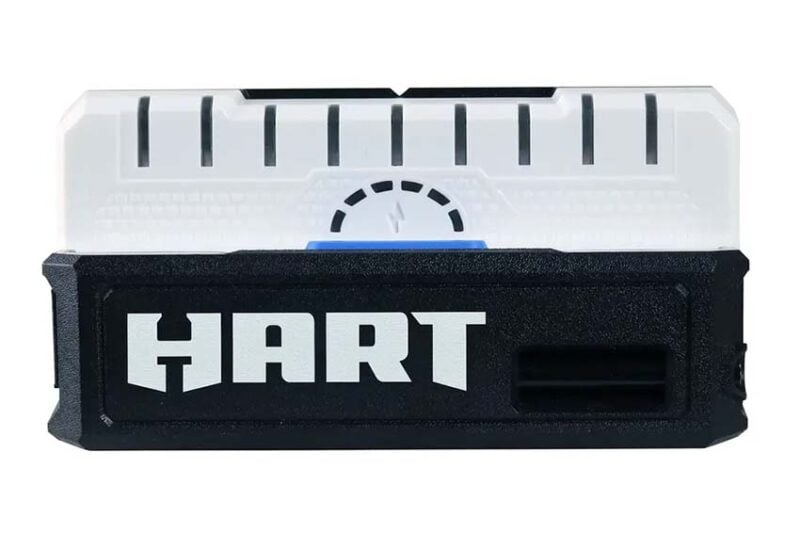
If you’re looking to get away from magnetic models and shift to a whole stud electronic style, it’s hard to argue with the performance and price of the HART Professional 9-LED Stud Finder. As our pick for the best stud finder for the money, it’s accurate, it’s inexpensive, and it’s easy to use. Thanks to the latest upgrade, it now has an easier-to-see AC detection indicator. We can’t ask for much more than what you get with this tool!
Pros
- Wide-view whole-stud finder
- One-hand operation
- AC detection
- No calibration needed
- Excellent value
Cons
- Slightly oversensitive to 120V in-wall voltage
Price: $27.88
Best Stud Finder App
Stud Finder by Tue Nguyen Minh
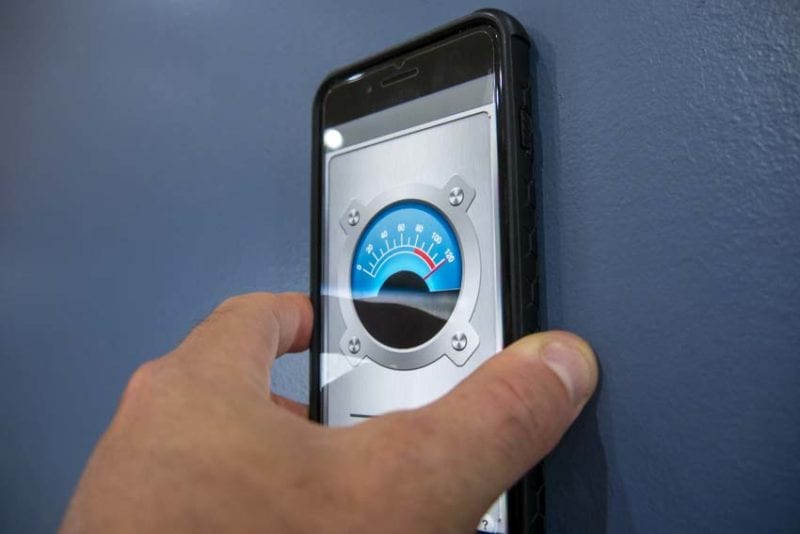
Your best stud finder app options use your phone’s EMF sensor (electromagnetic field) to hone in on the source. The most reliable we’ve found is Stud Finder by Tue Nguyen Minh on iPhone’s app store. The interface is simple to understand and easy to read.
The downside is that there’s some guesswork based on where your EMF sensor is. Considering you only have 1 1/2 inches of stud to hit, being off a little can move you off of your target completely. In our testing, it’s not as accurate as other stud finders. However, if you come at it from several directions, you can dial in the nail’s position reasonably well.
It’s not available on Android, though. For that system, we couldn’t find one we could genuinely recommend you use.
Pros
- No cost
- The meter shows you signal strength as a measure of closeness
Cons
- Iffy accuracy
- For best results, you need to mark the strongest signal multiple times from several directions to hone in on the source
Price: free
Best-Selling Stud Finders
There are plenty of models to choose from out there. Here’s what others are buying from leading retailers.
Amazon
- Kreg Magnetic KMM1000LZ – $29.99
- JAXWQ 139-410-BLACK – $27.99
- Zircon StudSensor A100 – $28
Acme
- Bosch Wall/Floor Scanner with Radar D-tect 120 – $379
- DEWALT 3/4 in. DW0100 – $17.99
- Zircon MultiScanner i520 OneStep – $69.99
Lowe’s
- CRAFTSMAN Metal and Wood Stud Finder CMHT77633 – $12.98
- Zircon StudSensor L20 274870 – $13.98
- Franklin Sensors ProSensor 1.6-in Scan Depth FSX110002 – $54.98
Home Depot
- Bosch Digital Wall Scanner GMS120 – $99.97
- StudSensor HD55 73336 – $19.97
- StudSensor HD35 65944 – $17.97
Best Stud Finder – More Recommendations from Brands We Trust
While the choices above are excellent in their own right, there are other stud finders we use and recommend. Check out these options if you still haven’t found one that meets your needs.
DeWalt 1 1/2-Inch Electronic Stud Finder DW0150
This is an inexpensive Pro-grade electronic model that forgoes some of the bells and whistles to keep the price down. Like our Ryobi pick, Its flat design isn’t for everyone.
Price: $20.99
Franklin 710+ Electronic Stud Finder
This model has been a top pick of ours for years before being replaced by the M210. It’s a solid performer with 13 sensors. The main difference between the 710+ and the M210 is that this model has fewer LED indicators. It’s a solid choice for Pros.
Price: $54.95
Stud Buddy Magnetic Stud Finder
The elongated design of the Stud Buddy has earned a good following and its strong magnets make finding nails and screw easy. It’s a good pick for DIYers who want an inexpensive solution without worrying about electronics.
Price: $9.97
StudPop Magnetic Stud Finder
StudPop was one of the first magnetic models to feature a super-strong magnet. On most walls, you can easily locate nails and screws and then lift your hand away while the Stud Pop stays put on the wall leaving both hands free to work. They’re available in a range of color choices.
Price: $8.95 – $13.95
Zircon L30 Electronic Stud Finder
The L30 is a basic edge-finding unit. While its 3/4-inch capacity doesn’t scan as deep as higher-priced models, its sub-$20 price tag makes it an attractive option as an entry-level electronic stud finder.
Price: $17.98
Zircon M4 Electronic Stud Finder
The M4 is Zircon’s full-featured electronic stud finder. It features 5 scanning modes – TC (Target Control), StudScan, DeepScan, Metal Scan, and AC Scan. Its ability to reduce the number of false positives to help you avoid drilling into PVC and metal pipes sets it apart in a crowded field of options. Prefer shopping at Lowe’s instead? Look for the H4 to get the same features and performance.
Price: $69.97
What is a Stud Finder?
Stud finders help you detect where studs are behind your wall. Most people using one are setting a nail or screw, usually to hang something that might pull through the drywall on its own.
Stud finders primarily come in two categories.
Magnetic stud finders work by using a magnet to locate the screws that hold your drywall in place. They cost less than stud finders that use active sensors, but they’re more limited. They can’t detect the actual stud, so there’s some guesswork as you look for the exact center.

Electronic stud finders actively detect differences in wall density to find studs. They typically use batteries as a power source. Many can detect wood or metal studs and some have AC power detection. The simplest models help you find the edges of studs while others show you the entire stud width. These are more expensive than magnetic models, but not prohibitively so. Some of the best professional stud finders still cost less than $25.
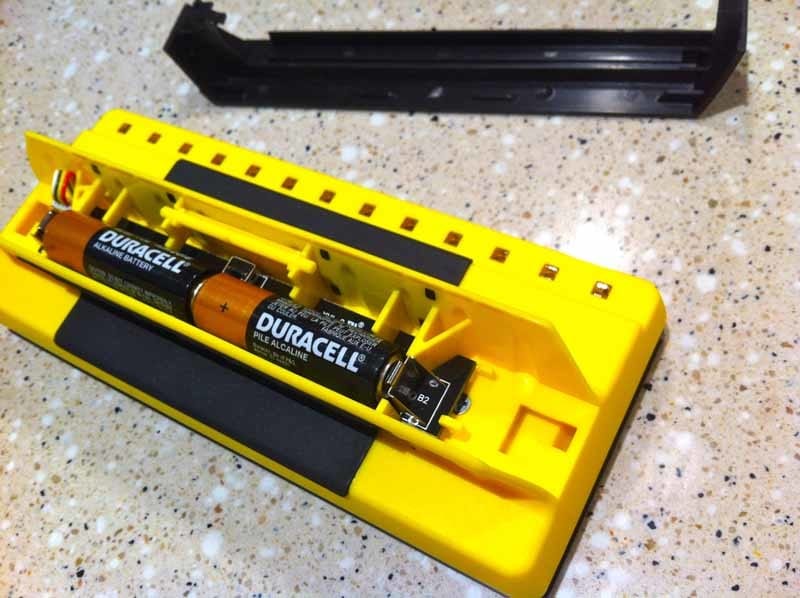
What About Wall Scanners?
There are also other types of tools to detect objects beneath the surface of a wall. Advancing beyond the types of stud finders we recommend, you encounter wall scanners. These radar-like tools typically only get used by professionals to “see” what’s behind the wall beyond just studs.
There’s an App for That
With the evolution of technology, you can find stud finding apps for both iPhone and Android smartphones. They use the phone’s magnetometer (the sensor that drives the compass) to detect metal nails or screws behind the drywall. Presumably, those nails or screws will be in the middle of that stud you’re attempting to locate. In our experience, they’re not accurate enough to rely on.
Tips for Using a Stud Finder
- Make sure you know if your model needs calibration and how to do it.
- Keep your stud finder flat against the wall while you’re detecting.
- Keep your hands off of the wall to avoid interference.
- Unless you’re using a whole-stud detector, mark your position from several directions to ensure the best accuracy. Use a piece of painter’s tape on the wall if you want to avoid marking directly on the paint.
- Combine a stud finder with a cross-line laser to mark the entire length of the stud or to hit the same height across multiple studs.
- Stud finders also work great on the ceiling for finding joists.
- Studs are typically 16 inches apart (walls) and occasionally 24 inches (ceilings). If you’re having trouble finding one, get a good reading on another part of the wall and measure over.
- Keep an extra set of batteries in your toolbox for electronic stud finders.
- Trying to detect studs in plaster walls sucks. Most stud finders are iffy at best on plaster and lathe. Use a dedicated metal detector instead (recommendation below).
Why You Can Trust Pro Tool Reviews
Ever check out a “review” site and you can’t tell if they actually tested the tools or if they’re just “recommending” the Amazon top sellers? That’s not us. We won’t recommend anything unless we’d use it ourselves, and we don’t care who the primary retailer is. It’s all about giving you a legitimate recommendation and our honest opinion of each product.
We’ve been in business since 2008 covering tools, writing reviews, and reporting on industry news in the construction and lawn care industries. Our Pro reviewers work in the trades and have the skills and experience to know whether tools can perform well in the field.
Each year, we bring in and review more than 250 individual products. Our team will put its hands on hundreds of additional tools at media events and trade shows throughout the year.
We consult with innovators in the technology and design of tools to gain a broader grasp of where these products fit and how they work.
We work with more than two dozen professional contractors around the United States who review products for us on real job sites and consult with us on testing methods, categories, and weighting.
We’ll provide more than 500 pieces of new content this year absolutely free for our readers—including objective evaluations of individual tools and products.
The result is information you can trust because of the editorial, scientific, and real-world professional experience we collectively utilize each and every time we pick up and test a tool.

